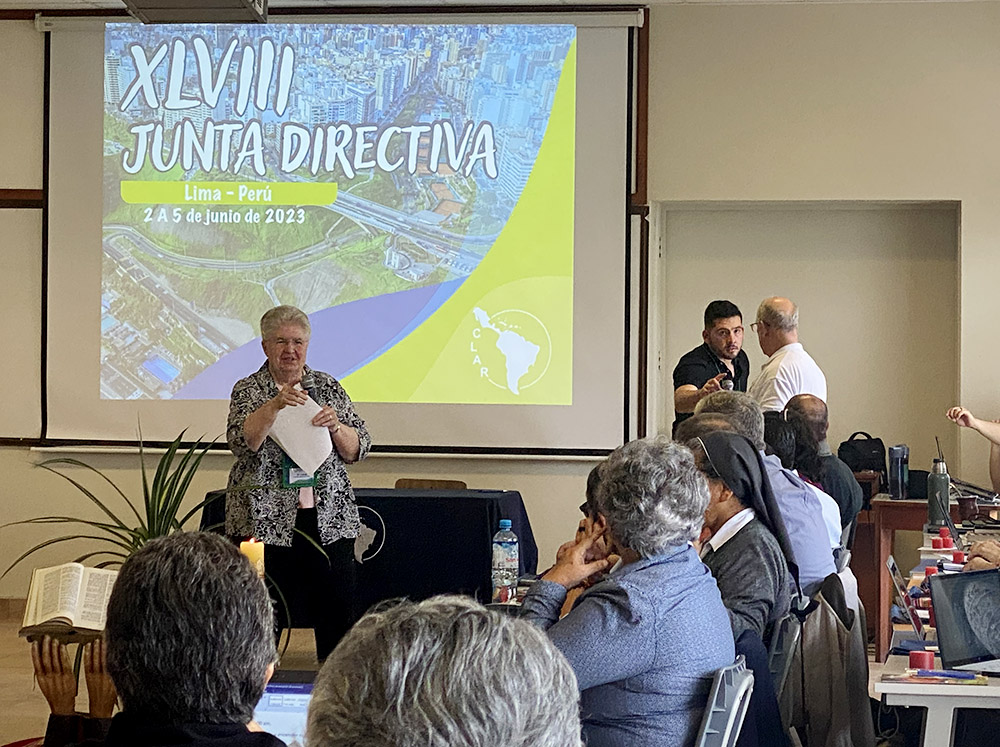
St. Joseph Sr. Carol Zinn, executive director of the Leadership Conference of Women Religious, speaks to the board meeting of the Confederation of Latin American and Caribbean Religious in Lima, Peru, June 2. (GSR photo/Rhina Guidos)
In an early June meeting of women and men religious from Latin America and the Caribbean, the head of a U.S. group of sisters spoke about church life in the U.S., its brokenness and the country's polarization, and asked them to consider the possibility of a "new beginning" that would include groups of consecrated life from all corners of the Americas.
"No more Canada, U.S., Central America, South America," Sr. Carol Zinn, executive director of the Leadership Conference of Women Religious, said to those gathered June 2 for a board meeting of the Confederation of Latin American and Caribbean Religious (CLAR) in Lima, Peru. "[Let's] think about consecrated life of the Americas and still celebrate Canada, the United States, Central America, South America."
It's hard to say at this point what a "new beginning" looks like but top leaders at the Latin American CLAR said they were interested in talking with Zinn, a Sister of St. Joseph of Philadelphia, about collaborating with sisters in the U.S.
"I loved what Carol said, of that dream of a religious life of the Americas, where there isn't South, North or Central America but all, everyone working toward the same cause," Sr. Daniela Cannavina, CLAR's general secretary and a member of the Capuchin Sisters of Mother Rubatto, told Global Sisters Report June 4.
Advertisement
Sr. Liliana Franco, CLAR's president, said they could look at initiatives where its members could participate.
"For example, working with migrants, it's something that concerns us all," said Franco, of the Company of Mary. "So, how do we take part? How do we join forces?"
The conversation took place as members of CLAR seem to be looking for signs of change prompted by the synod — a three-year process of listening and dialogue that Pope Francis has called the church to take part in from 2021 until 2024.
Cannavina told the gathering about a regional synod meeting she attended in early 2023 in El Salvador, where she realized that another type of Catholic Church — one that listens more and is less hierarchical — is possible.
Those gathered for the CLAR meeting, which included general secretaries and presidents of conferences from Latin America and the Caribbean, as well as consulting theologians, spoke of new structures and systems, customs and practices to champion the mission of the church among the poor and vulnerable. Their vision is one of transformation in the church, where clericalism, personal interests and power-seeking among some church members are set aside.
'I love my homeland and it is broken, as is the church.'
—St. Joseph Sr. Carol Zinn
In that setting, Zinn spoke of her time as president of LCWR from 2012 to 2015, when the Vatican opened an investigation into the organization representing more than 50,000 women religious in the U.S. — a process called an "apostolic visitation."
"You may remember those were the three years that there was a little conversation with LCWR and the Vatican," she told CLAR members. "It was a transformation because what we learned is that we were looking outside at the church and the church was looking at us. And we never had a conversation. So, one of the graces of that very hard journey is a commitment to come to the table together — bishops, priests, consecrated life, laity — and so LCWR is trying to do that."
Zinn spoke of polarization in the U.S., where it's difficult to come together whenever there are differences of gender, race, ethnicity, economics — among others — that have seeped into the life of the church and affect the ability in the country to work together on issues such as climate change and immigration.
"It would be a mistake for me to not say something about my country," she said to the group. "I love my homeland and it is broken, as is the church. There's a lot of pain. There is a lot of injustice, a lot of suffering, which is political, economic, racial."
She asked for prayers for LCWR as it takes a "contemplative time to step back and to ask God: What is ours to do as leaders of consecrated life of women? What is ours to do in a country and a church that is so polarized?" she said.
"And so, I ask you to pray for us because we have made a commitment that our work is to be in those uncomfortable situations of polarization. How to have an encounter with someone who does not think like me or look like me, or speak like me, or believe like me. How to listen deeply and then how to discern, how do we go together to God?"








